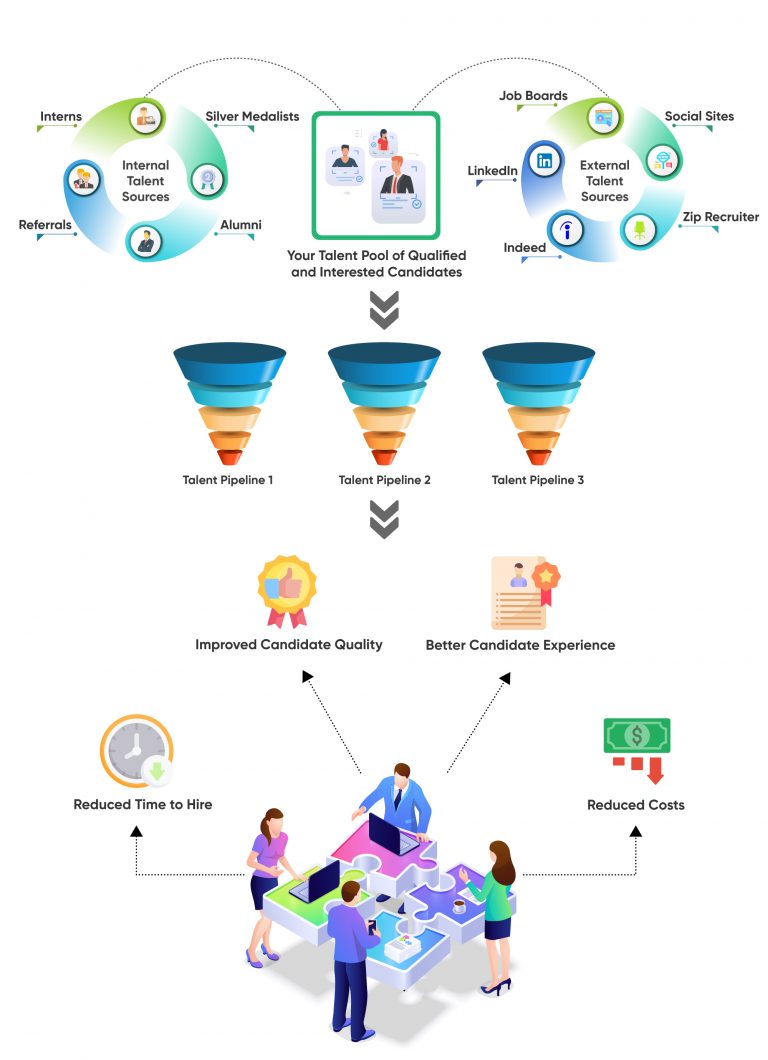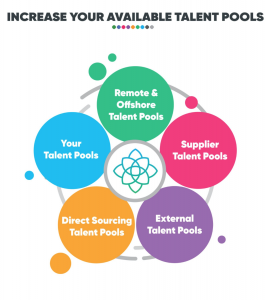Picking the most qualified candidate for a job opening is the number one priority for hiring teams, but gathering and maintaining candidate information in advance of immediate hiring needs can help make your hiring program consistently successful. Talent Pools combined with proactive Talent Pipelines ensure greater hiring success. By collecting and enriching candidate information, Talent Pools serve as the building blocks for Talent Pipelines. Talent Pipelines, in turn, allow candidates to be nurtured from cold leads to warm candidates — enabling ‘On-Demand Hiring’.
So, what is a Talent Pool?
Talent Pool Definition
A Talent Pool acts as a repository of candidate information that can be leveraged at any time. Using a Talent Pool, businesses can make their recruitment processes proactive and hire for critical roles quickly.
A talent pool comprises a list of candidates that have been added to a company’s internal talent database. Typically an internal talent pool consists of candidates who have expressed interest in the organization and whose skills and competencies align with the company’s goals and objectives. The talent pool database includes detailed information about candidates — their skills, domain expertise, level of experience, education, potential jobs they can fill, and more. Your internal talent pools consist of:
- Candidates that are in your internal database (ATS or Applicant Tracking System)
- Candidates that have applied through the career website (Applicants)
- Candidates that were interviewed but not selected (Silver Medalists)
- Candidates that are referred (Referrals)
- Candidates that come through an internship program (Interns)
- Candidates that have previously worked for the organization (Alumni)

Why Should You Develop A Talent Pool Strategy?
Starting the recruitment process from scratch for every job opening is time-consuming and strains resources. In a fast-paced and increasingly competitive hiring landscape, having access to potential candidates immediately speeds up the hiring process and reduces cost.
Enter Talent Pools.
Talent Pools: The stepping-stone to solid talent pipelines
Talent Pools are a great way to build robust talent pipelines by collecting, filtering, and managing candidate records. Using a talent pool, businesses can stay on top of their recruitment needs by having a steady flow of interested and qualified candidates to fulfill jobs, all tagged with relevant information. Well-managed talent pools don’t just collect information, but also keep it up to date and enriched wherever possible so the records are useful when they are needed. Having a well-managed talent pool gives hiring teams immediate access to potential candidates to fill their open positions.
A well structured talent pool paves the way for proactive talent pipelines that are strategically designed to meet a company’s current and future hiring needs.
Importance of Talent Pipelines
Creating solid Talent Pipelines is essentially a proactive and predictive hiring strategy. Talent Pipelines help businesses identify upcoming talent needs early and also provide access to engaged and nurtured candidates on-demand to fill positions immediately. Talent pipelines are especially effective for high volume and recurring roles when the similar candidates are often required. In short, by developing talent pipelines, businesses can become agile and proactive in their hiring efforts.
Apart from providing a stable flow of talent and rapidly reducing the time-to-hire, using Talent Pipelines improves the overall candidate experience. By carefully analyzing your existing talent pool, you can engage different pipelines of talent with personalized content and customize your application/hiring processes to suit specific candidate categories. Catering to your potential candidates’ needs garners trust and reflects positively on your employer brand. In fact, a survey conducted by Careerarc found that 82% of the participants considered employer brand and reputation before applying for a job — a 7% increase in the past five years.
Expand Your Talent Pools with Prosperix

Prosperix helps you build a stronger workforce by extending your reach into additional talent pools to find quality candidates in addition to your internal talent pool. Our on-demand talent pool offering includes:
- Crowdstaffing Hiring Marketplace which consists of a vetted list of suppliers and their talent pools
- Direct Sourced talent pools
- Externally sourced talent pools from job boards, LinkedIn, social sites, web destinations, and online marketplaces
- Local, remote, and offshore talent pools
With more haystacks to search and select from, your ability to find ideal candidates increases exponentially. Use our diverse and expansive talent pool solutions to find the best candidates for your business.

